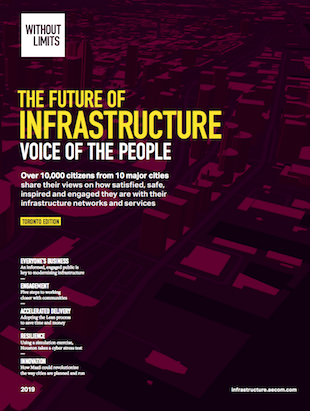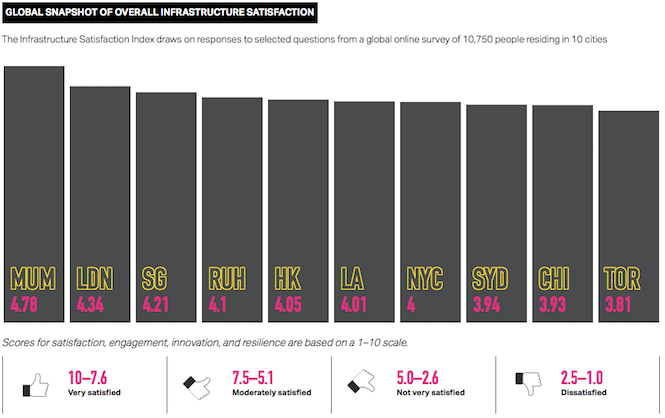
AECOM releases second Future of Infrastructure report
January 22, 2019
By
CCE
This year's report captures data and opinions from 10,000 residents across 10 global cities — Chicago, Hong Kong, London, Los Angeles, Mumbai, New York, Riyadh, Singapore, Sydney and Toronto.
 Among 10 major cities surveyed around the world, residents of Toronto express the lowest overall satisfaction in their city’s infrastructure, and for people in the Greater Toronto Area the upgrading of public transportation is their top priority for future improvements followed by improving environmental sustainability and upgrading utilities—this is all according to a new global report released by AECOM.
Among 10 major cities surveyed around the world, residents of Toronto express the lowest overall satisfaction in their city’s infrastructure, and for people in the Greater Toronto Area the upgrading of public transportation is their top priority for future improvements followed by improving environmental sustainability and upgrading utilities—this is all according to a new global report released by AECOM.
For the second year AECOM has published an annual global infrastructure report, this year’s version captures data and opinions from 10,000 residents across 10 global cities — Chicago, Hong Kong, London, Los Angeles, Mumbai, New York, Riyadh, Singapore, Sydney and Toronto.
Entitled, The Future of Infrastructure: Voice of the People, an interactive online site provides briefs and statistics to read, and the full report can be downloaded by filling out a brief form.
“Residents of cities around the world want greater say in infrastructure planning, and they are growing impatient with delays in the delivery of modern infrastructure systems that can improve mobility, connectivity and quality of life,’’ says AECOM Chairman and CEO Michael S. Burke in a company release. “Their views should be a call to action for wider government engagement, and new public and private partnerships that can advance ideas, funding and advocacy, and speed the projects that lead to growth and urban well-being.”
Five insights from this year’s report:
- There is a public engagement gap. Most of the cities underperform when it comes to engaging with their citizens on infrastructure, with an aggregate global average of 3.3 out of 10. Respondents said they want a more focused interaction, which could go a long way toward improving perceptions of city governments’ performance on infrastructure and securing support for future projects.
- Residents want to help — and some are willing to pay. Almost half (46%) of respondents overall are willing to share personal data — the lifeblood of smart cities — to help city agencies improve infrastructure and services. In several cities (37% of respondents globally), residents indicated a willingness to pay higher taxes to fund infrastructure improvements. Both commitments underscore citizens’ desire to play their part in delivering better infrastructure.
- Boosting resilience against cyberattacks is a concern. More respondents have confidence in their city’s ability to protect infrastructure against natural disasters and terrorist attacks than those who do not. However, less than one-third (32%) have confidence in their city’s defenses against cyberattacks. Citizens need increased reassurance from city authorities about the capabilities of their infrastructure to withstand such events.
- Wanted: More private-sector involvement. A clear majority of city residents overall (63%) believe the private sector should be more involved in the development of infrastructure.
- Upgrading public transportation and enhancing environmental sustainability are top improvement priorities. Upgrading public transportation — particularly roads and underground rail — is the top infrastructure priority for those surveyed. Improving environmental sustainability — through solar power, recycling and waste-water reuse initiatives, for example — is a close second and tops five cities’ to-do lists.

The report also outlines ways that infrastructure stakeholders can ensure greater engagement to secure and maintain citizens’ support during projects, and following completion.
It also provides guidance for aspiring smart cities about the benefit of exchanging data and ideas with companies, application developers and other innovators, as well as an opportunity to obtain citizens’ personal data if city authorities can ensure them it’s being handled securely and contributing to specific improvements.
The report also confirms that sustainability continues to be important to residents, and with high public interest, green initiatives can boost engagement. While long-term planning is not going away, planners who adopt an agile approach can test, design and scale projects at pace — and engage more deeply with citizens.
The report was produced by AECOM in collaboration with research firm Longitude. It was compiled in two ways: through a telephone survey of more than 10,000 people across 10 major global cities including Hong Kong (1031 respondents), Mumbai (1088), Singapore (1109), Sydney (1096), London (1118), Riyadh (980), Chicago (1014), Los Angeles (1121), New York (1128), and Toronto (1065). And secondly, the firm conducted qualitative interviews with a range of senior figures in the global civil infrastructure industry where AECOM was identified as the research sponsor.